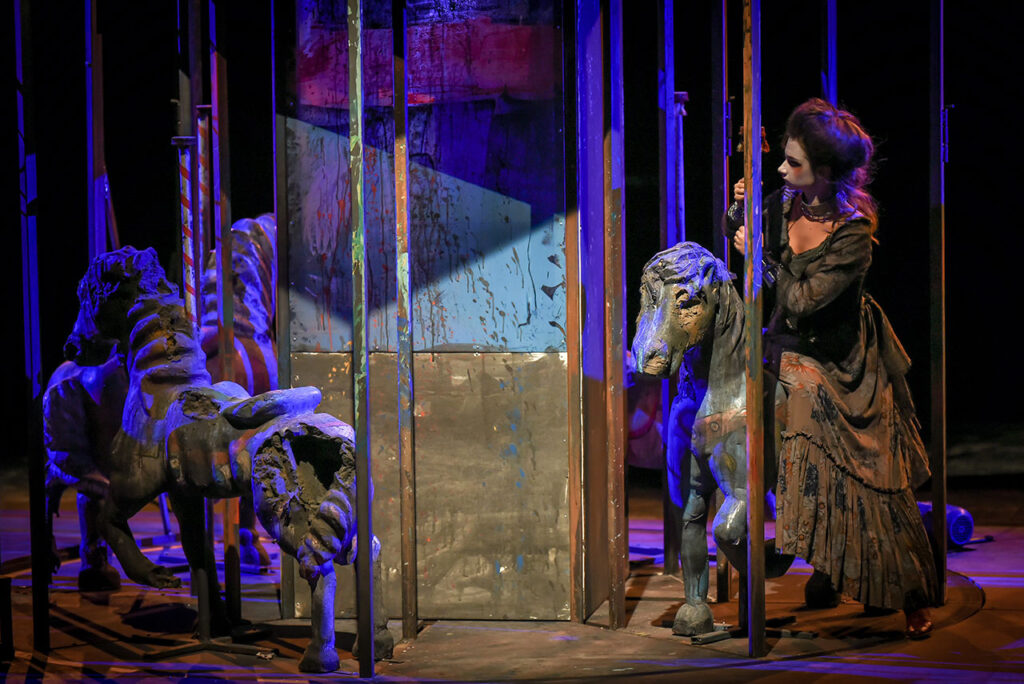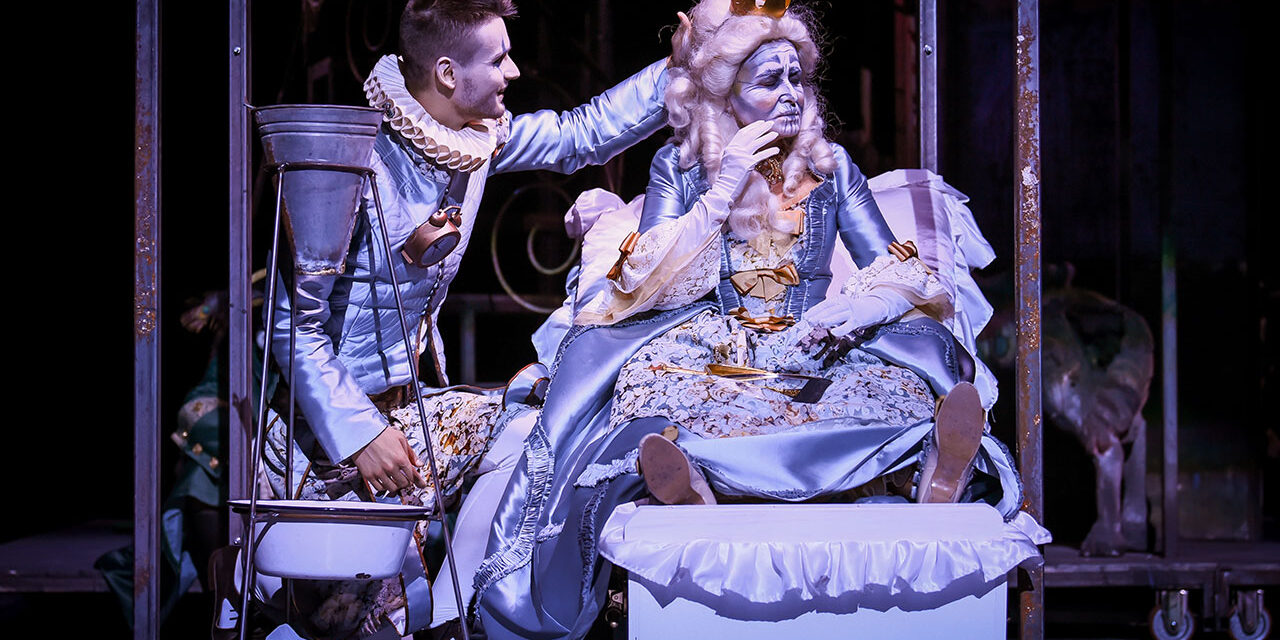Serbian National Theater, premiere 21st September 2023
When Barbie, in Greta Gerwig’s film, decided to become a human after a conversation full of attention and tenderness with her creator, Ruth Handler, she first went to a gynaecologist as an expression of accepting her embodiment, sexuality, reproductive rights, her awareness of her independence and the importance of self-care. When the dolls on the carousel of the alchemist Sven (Nebojša Savić) from Randelhon in Bertove kočije ili Sibila came to life, on the other hand, completely bewildered by the sudden change, their creator uses them to create the “perfect system”. But the audience never finds out what that means for Sven. While for Barbie, coming to life is a choice and a reward, in this play, it will turn out that being human is a punishment.
Based on the text by Velimir Lukić from the 1960s and directed by Ivan Ceovićr, the play is a collection of scenes featuring various pairings of puppet. However, the patchwork of these scenes creates confusion instead of a meaningful – or at least appealing – work. Oddly, most of the puppets in this show do not reference their newfound embodiment. Only Princess (Tijana Milovanov) stereotypically fears losing her beauty – this is her only characteristic trait.
The characters have thousands of questions (what is love, death, what does happiness mean) and they wait for Sven to answer them. The only really dramatic, exciting element of the story is the narrative of the clown couple and her lover. Consistent with clown tradition and theory, the clown as a character type has no past and future; they only exist in the here and now. Đorđo (brought to life with effortless grace by a mesmerizing Aleksandar Sarapa) is the most striking character in the entire piece, the only three-dimensional character with flaws, fears and feelings, going through twists and convincingly learning to be human in front of the eyes of the audience.
In the beginning, Đorđo can’t understand what he feels towards his wife Žermen (Ivana Pančić Dobrodolac, performing with brilliant stage movements), then he struggles to define love, fails to understand what betrays is, he tries to learn what a joke is, and ultimately ends up with his definition of being human— “I can hate, therefore I am.” His almost childish and naive perception of life is poignant and painful, the only thing with which the viewer (assuming the viewer is a human, not a puppet) can identify and develop empathy.

Bertove kočije ili Sibila. Photos: Marija Erdelji
The other stories, about the love-struck dance couple, Bert, the carousel keeper, and Sibyl, the object of affection for four men, don’t bring anything new to the narrative. The relationship between Sibyl (Anđela Pećinar in a role that doesn’t fully leverage her capabilities) and Sven is reminiscent of an ancient myth, akin to the tale of Pygmalion and the statue brought to life by the gods, whom he falls in love with. Their shared departure into twilight, however, lacks motivation, and many lines seem to emerge from nowhere. For instance, Sven states at the end to Sibyl that he recognizes parts of himself in her and vice versa. Not in one moment is the resemblance shown.
The puppets, their destinies, and the directorial treatment of the characters resemble the revival of artificial intelligence. While AI strives to become more like us and imitate humans, actors on stage in Bertove kočije resemble software that “fills” its files with human knowledge. They utter sentences resembling AI, make fundamental logical errors, question the meaning of basic words, and don’t find answers until a human explains. Only with data obtained from him, do they continue their thinking and repeat his words.
The end of the play, when the puppets kill each other, is directed in a style reminiscent of a cartoon or something from the horror genre – an unbelievable farce. While the characters in Velimir Lukić’s drama do reach the dramatic moment of a massacre in terms of dramaturgy, in the performance, it happens suddenly, without reason, and it lacks coherence.
More problematic is the way the three female characters (Princess Odila, Sibyl, and Žermen) embody three archetypes – a virgin, a whore, and a mother. Žermen is the mother of a plastic doll over whom she obsessively cares. Being a mother in a patriarchy means a woman cannot be sexually desired. Even when her husband suspects her of having a lover, it’s not about Žermen and her emotions, but rather the fear of the man being ridiculed. Princess Odila is a virgin, obsessed with her beauty, and Sibyl is labeled as a whore because she has kissed multiple men, and several are infatuated with her. Sven says he doesn’t believe she is promiscuous, but society demands there is a promiscuous woman. The misogyny and patriarchy in the show are unaddressed.
Cerović’s production contains some virtuosic acting, but, overall, it seems recycled. While it can be assumed that the author intended to create a politically engaged play that speaks about autocrats, a system designed to exploit people, and the blind obedience of citizens, instead of engaging in political theatre, it feels as if the authors have only approached theatre with a political perspective.
Credits:
Director: Ivan Cerović // Text: Velimir Lukić // Dramaturg: Božidar Knežević // Costume: Staša Jamušakov// Scenography: Željko Piškorić // Choreography: Milica Cerović // Composer Aleksandar Bahun
Cast: Anđela Pećinar, Miodrag Petrović, Nebojša Savić, Aleksandar Sarapa, Ivana Pančić Dobrodolac, Marko Savković, Ljubiša Milišić, Grigorije Jakišić, Milan Novaković, Aleksandra Pejić, Jovan Živanović, Tijana Milovanov, Aleksa Jovčić/Stefan Starčević
For tickets and further information, visit: snp.org.rs
Divna Stojanov is a dramaturg and playwright. She writes mainly for children and young people.








